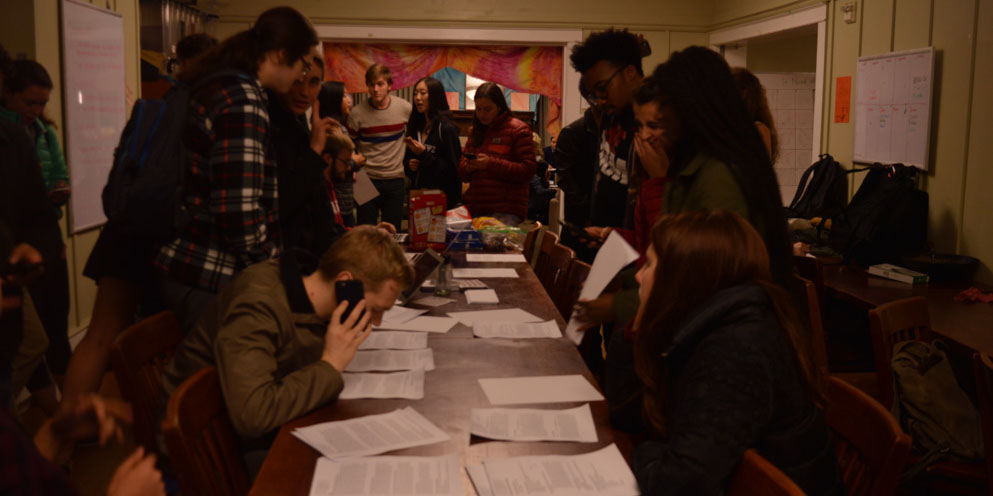“Hi, my name is Janet Coleman-Belin, a constituent from Santa Monica, California. I am calling to urge Senator Dianne Feinstein to oppose the continuation of the Dakota Access Pipeline.”
Coleman-Belin ’19 read this from a script, marked “Urgent 1,” lying on a dining room table in Columbae. The paper also included scripts opposing Neil Gorsuch’s nomination to the Supreme Court and Rex Tillerson’s nomination as secretary of state. Another paper, “Urgent 2,” contained scripts for Cabinet picks Scott Pruitt, Betsy DeVos and Rick Perry.
The scripts were part of Columbae’s “Resist Trump Action Party,” held on Jan. 31 and Feb. 14.
The event was a joint effort by Stanford Women in Politics (SWIP), the Black Student Union (BSU) and Politalk, a Columbae-based group, to mobilize students against President Donald Trump’s administration.
“With everything that’s been happening really quickly over the past week, I think it’s really important for people to realize that there’s still things you can do,” said Nora Tan ’18, eating associate at Columbae and a Politalk member. “You can still voice your concerns because those do matter.”
“If we end up being silent right now, people will think, ‘Oh, this is okay — we’re sliding by with the nomination of this person and this person,’ whereas if we try to push forward now, it’s like yes, there’s still that sliver of hope,” Tan added. “I think maintaining that hope is really important.”
As part of its resistance “parties,” Columbae opens its house to the public every Tuesday night from 9 to 10 p.m. The open space provides a place for anyone who wants to take direct action to do so.
A whiteboard in the Columbae dining room explains a three-step approach. First, it says, students should save their senators’ and representatives’ phone numbers as favorite contacts in their phones. Second, students should call the numbers using the scripts provided; for less time-sensitive issues, there is also a letter-writing script. Finally, participants are asked to message their friends and family and ask that they also speak up.
The gatherings serve as a starting point, with the hope that students who attend the event will take what they learned and apply it to their broader life.
“We’re hoping that we get new faces each time because I think that once somebody shows up and they realize how easy it is to call their representatives… They pretty much feel comfortable enough to do it on their own,” said Hattie Gawande ’18, co-president of Stanford Women in Politics. “The idea is, if people still want that support and that community, totally come on Tuesdays, but for people who really don’t feel comfortable calling their representatives for the first time, we’re providing that space to help them do that.”
The first Resist Trump Action Party was held during the week of many confirmation hearings, and therefore, those in attendance were primarily focused on voicing opposition to the Cabinet nominees. Because most of the hearings are over, this week’s event turned its focus on specific bills that have been proposed.
“It will be much more about broader action than about specific conformations in the weeks going forward,” Gawande said.
DeVos, Tillerson and several other controversial proposed Cabinet members were confirmed, despite the efforts of groups across the nation similar to the Resist Trump Action Party. The outcomes led many to express discouragement with their calls. However, Gawande disagrees.
“It does feel like a really tiny and insignificant action, but we know it works and we saw that during the Betsy DeVos vote,” Gawande said. “It’s highly unusual for confirmations to be as difficult as Trump’s confirmations were.”
DeVos, who is now secretary of education, had the closest confirmation vote in American history. This was partly due to Republican Senators Susan Collins of Maine and Lisa Murkowski of Alaska, who listened to complaints from many of their constituents and voted against DeVos along with all Democratic senators.
The most important thing, Gawande insisted, is to keep calling, no matter what.
“I think there’s a lot of skepticism in the pro-Trump camp that the momentum is going to keep going,” Gawande said. “I think they think that protest fatigue is going to set in… I think that if the pressure stays on months into his tenure, I think people are going to get a lot more nervous.”
Contact Emma Fiander at efiander ‘at’ stanford.edu.
